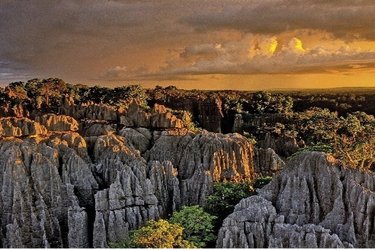Madagascar and climate change
As one of the poorest countries in the world, with a population growth rate of 2.6% per year (World Bank, 2020), Madagascar faces a number of socio-economic and development challenges.
Food insecurity and malnutrition rates have reached alarming levels since 2011, with around 35% of the rural population affected by severe food insecurity and 48% considered vulnerable (UNICEF). In 2019, 75% of the population will be living below the poverty line of $1.90 a day.
Home to around 5% of the world's biodiversity, Madagascar is also known for the richness of its natural capital. This rich biodiversity is found in several ecological regions, characterised by a variety of ecosystems: terrestrial (forests, agricultural fields and grassy areas), aquatic (wetlands, continental waters), marine and coastal. These different types of ecosystem are home to a specific and varied complex of flora and fauna.
Madagascar experiences variable climatic conditions due to insufficient or irregular rainfall, and is frequently subject to extreme weather events (cyclones, droughts, floods, etc.) causing significant damage. Between 1961 and 2017, cyclones caused the deaths of 1,193 people, destroyed 0.6 million homes and directly and indirectly affected 4 million people. Floods, another climatic disaster, affected more than 300,000 people during this period.

The choice of LIFE-AR
Madagascar, as a member of the group of Least Developed Countries (LDCs), joined the "INITIATIVE FOR EFFECTIVE ADAPTATION AND LONG-TERM RESILIENCE or LIFE-AR" through the Ministry of the Environment and Sustainable Development (MEDD), by signing the protocol during COP28 in Dubai, and is thus one of the countries in the second cohort with Senegal, Nepal and Benin.
Madagascar recognises that current business-as-usual approaches to climate change are not working and that global responses to climate change are not ambitious enough, hence its support for the initiative. The fight against climate change is one of Madagascar's priorities, and it hopes that the funds allocated to local communities will be able to finance concrete projects contributing to their resilience.
Read the message from Mr Max Andonirina Fontaine, Minister of Environment and Sustainable Development.

Next steps
Madagascar is currently (2023=2025) in the Establishment phase of the initiative, and plans in the coming months to inform and raise awareness among stakeholders about the LIFE-AR vision, with the support of the Interim Secretariat. Madagascar is also currently in the process of selecting a fund manager to facilitate the transfer of funds in the country.

